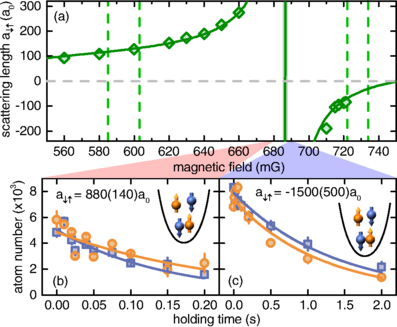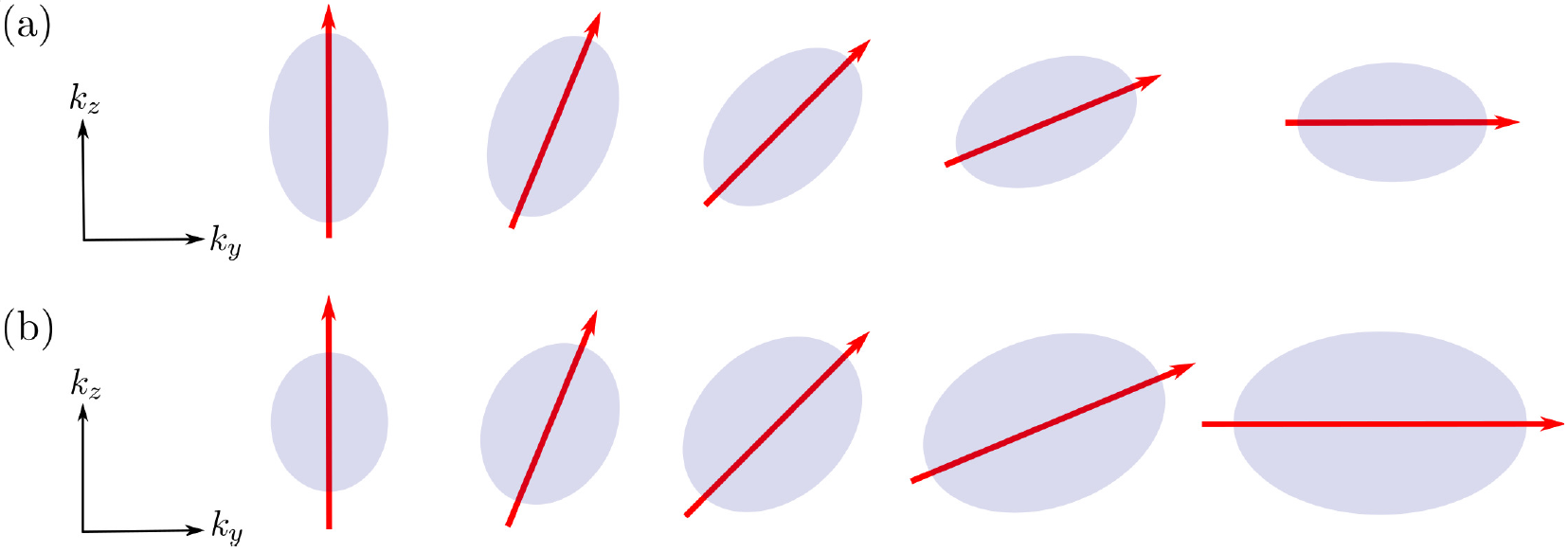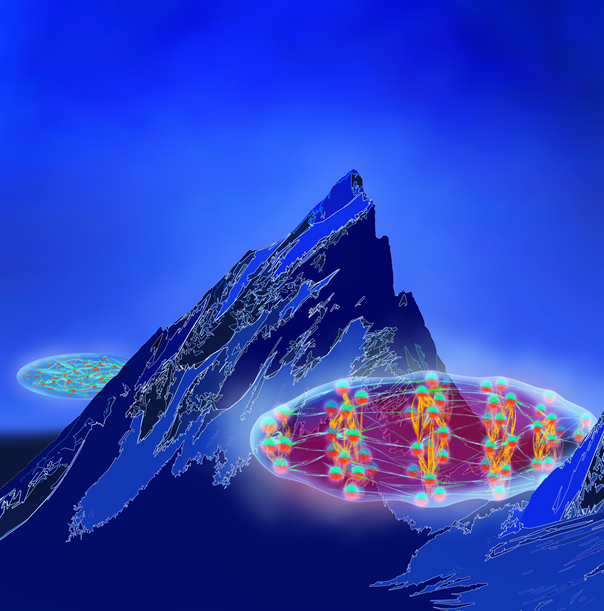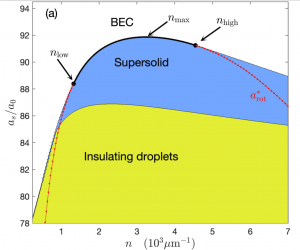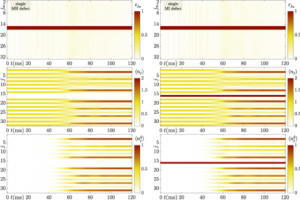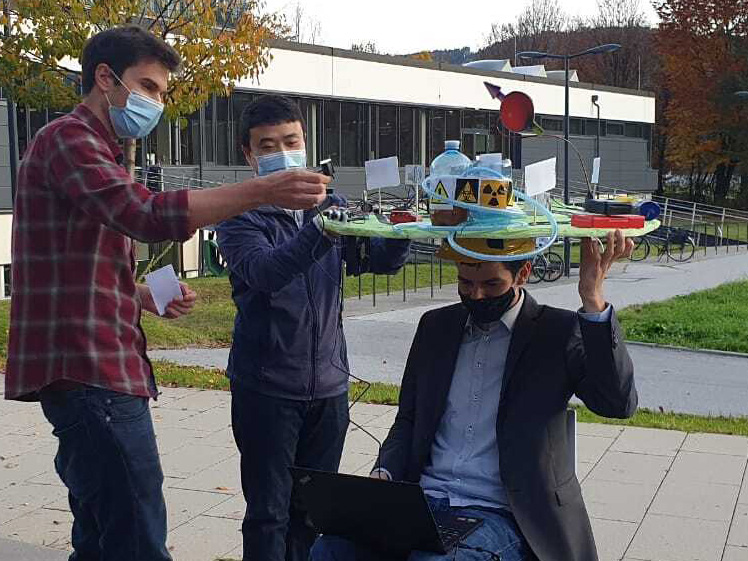
2024 PhD Openings!
We are happy to announce that our dipolar quantum gas group has two PhD positions open for 2024/2025!

Murder Mystery Dinner
Our 2024 group dinner took place on the 18th of January at CasoinN da Giorgio restaurant, with a 1920’s Murder Mystery theme!

Christmas celebration
Our team participated at the christmas celebration of the Institute, this time at a hut above Innsbruck!

Glitches in supersolids: links between neutron stars and quantum matter
By emulating the connection between a rotating supersolid phase and an external solid phase, we were able to replicate “glitches” – sudden jumps in the solid angular momentum driven by quantum vortices leaving the supersolid.

Cluster of Excellence Quantum Science Austria granted
Three Clusters of Excellence in Innsbruck have been funded! With highly endowed clusters of excellence, the Austrian Science Fund FWF creates Austrian flagships of basic research. The University of Innsbruck will coordinate the Cluster of Excellence for Quantum Sciences.

Atoms in Tweezers
In the T-REQS lab we have now loaded atoms in our optical tweezers.

Vortices in a dysprosium gas
By stirring the magnetic field which polarizes the atoms in a dysprosium condensate, we were able to generate vortices–tiny quantum tornadoes–in a dipolar gas for the first time!

Bloch Oscillations
By letting an erbium quantum droplet fall under gravity through an optical lattice, it is possible to understand the inter-atomic interactions and quantum fluctuations through variations of the Bloch oscillation.

ERC Advanced Grant DymetEr has been funded!

Happy 10th Birthday to the first Erbium BEC!
Our group studies dipolar quantum gases made of Erbium (Er) and Dysprosium (Dy) atoms. These extraordinarily magnetic species are a powerful new resource for reaching quantum simulation with strong connectivity, in which each atom is coupled to the other over long distances, and exploring exotic phases of matter that have no classical counterpart.
We have three labs: the ERBIUM LAB, where Er was Bose condensed for the first time ever, the Er-Dy LAB which studies quantum dipolar mixtures under a quantum-gas microscope, and the T-Reqs LAB, where we trap Er atoms in arrays of optical tweezers for Rydberg physics. Recently, we have established a theoretical subdivision aimed at studying and predicting dipolar phenomena in dipolar quantum gases and mixtures.
The group, led by Francesca Ferlaino, is jointly located at the Institute for Experimental Physics (IExP) of the University of Innsbruck and at the Institute for Quantum Optics and Quantum Information (IQOQI) of the Austrian Academy of Sciences, and it is part of the Innsbruck Center for Ultracold Atoms and Quantum Gases.
Follow our group’s updates on  .
.
News from the labs
In our Erbium experiment, we have created the first two component dipolar Fermi gas with tunable interactions. This paves the way to studies of BEC-BCS physics in presence of an unprecedented few-body scattering scenario, including anisotropic long-range dipolar interactions and anisotropic short-range interactions.
Keep Reading ...
In collaboration with our theory colleagues from Serbia (Antun Balaž, Vladimir Veljic), Germany (Axel Pelster) and Brazil (Aristeu R. P. Lima), we have investigated the ground-state properties of dipolar Fermi gases, extending the current understanding to the case of arbitrary dipole orientation and trapping geometries.
Keep Reading ...
Now in Nature Physics! In collaboration with our theory collaborators from Innsbruck (Rick van Bijnen) and Hannover (Falk Wächtler and Luis Santos), we have observed for the first time so-called roton quasiparticles in an ultracold quantum gas of highly magnetic bosonic erbium.
Keep Reading ...
Group news
Lauriane and Francesca, together with Blair Blakie and Danny Bailly (Otago University), theoretically studied the supersolid phase diagram of dipolar quantum Bose gases in cylindrical geometries. The work is now published in Physical Review Research.
Keep Reading ...
Bing Yang collaborate with Had C. Halimeth, Robert Ottl, Ian P. McCulloch and Philipp Hauke in theoretically studying the robustness of an ultra cold-atom quantum simulator against defects.
Keep Reading ...
Dani held his defense for his PhD thesis and is now officially a Doctor of Philosophy. He will continue to carry out his research as a post-doctoral fellow beginning of next year in the group of David Norris at the ETH. Congratulations and good luck!
Keep Reading ...
Welcome and goodbye
![]() .
.










